By Maggie Shui
A few weeks ago, Alex* was at her family home in Tauranga and posted an Instagram story, limited to her ‘close friends’ list, with an exasperated selfie and a paragraph that opened with: “Just had a 40 min argument with my dad about the Hong Kong protests.” A few lines later, she states, “Being Chinese is fucking stressful I swear to fucking god.”
On 9 June, hundreds of thousands of demonstrators gathered in Hong Kong to protest an extradition bill that, if passed, would allow people arrested in Hong Kong to face trial in mainland China - one more step in Beijing’s encroaching rule over the special administrative region of Hong Kong during this 50 year period of ‘one country, two systems’.
Three months on, the protests continue. Hong Kong chief executive Carrie Lam has announced that the extradition bill will be withdrawn, but the protests have grown to be about so much more - or perhaps they always were. They are about police brutality, they are about the right to protest and, like the 2014 Umbrella Revolution, they are about genuine universal suffrage. The protesters have outlined five key demands and, in the wake of the announcement of the extradition bill’s withdrawal, are reiterating: “Five key demands, not one less.”
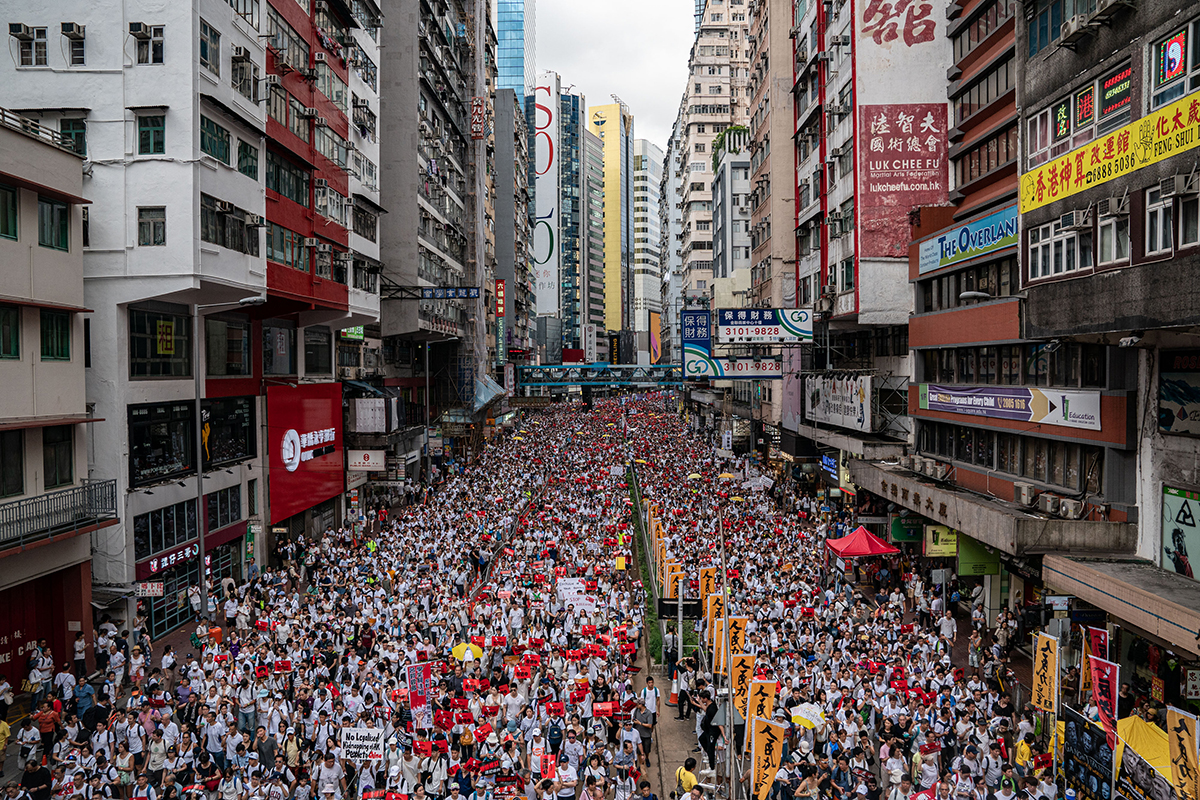
Protesters march on a street during a rally against the extradition law proposal on 9 June 2019 in Hong Kong. (Photo by Anthony Kwan/Getty Images)
Most people of the New Zealand Chinese diaspora in their 20s and 30s are, if not in full support of the Hong Kong protesters, sympathetic to the cause.
But what about our parents? It’s complicated.
Yue*, 29, moved from China to New Zealand a few years ago, leaving a country where the restrictions on speech left her feeling existentially null. “It just made me feel like I’m meaningless, because you can’t get your voice out.”
Her view on the protests is clear: “I’m pro-Hong Kong. Like, of course.”
Her dad, however, calls the protesters 小痞子 (xiǎo pǐzi), a term used to describe young, uneducated and ambitionless people who dabble in petty crime.
“He thinks they don’t know what they’re doing,” says Yue, “and he thinks this movement is doomed to fail and he thinks to disturb a society like this will only harm the economy, and is not going to help the democracy movement at all.” Yue’s dad has even suggested to her that the protests are funded by Western powers who want to encourage a coup.
It’s a view that’s more or less echoed by other parents of Chinese New Zealanders I’ve spoken to. Jamie*, who moved here from Guangzhou when he was 11, says his mum has called the protesters “unpatriotic”. She thinks “they’re disturbing the stability” and “sees some of them as doing things in bad faith” - for example questioning whether the woman who was pushed to the ground during the incident at the University of Auckland was “faking it”.
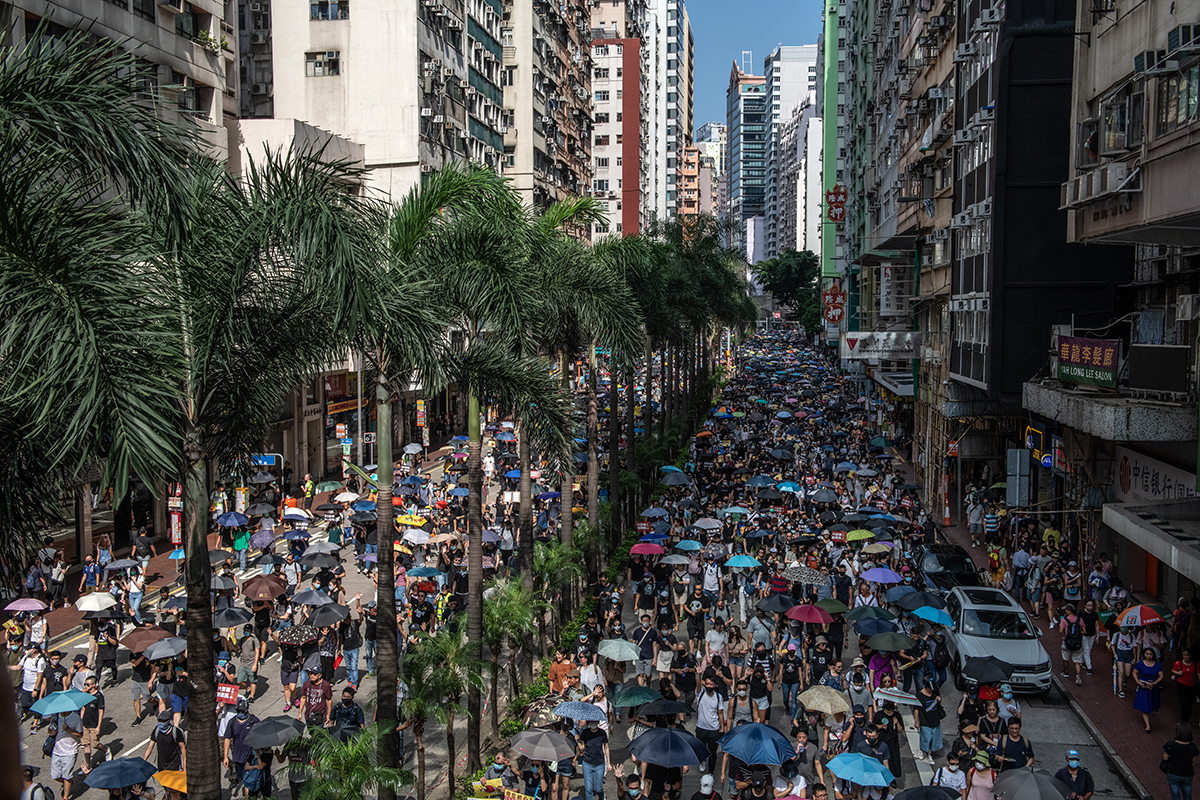
Protesters march on 15 September 2019 in Hong Kong, China. (Photo by Carl Court/Getty Images)
However, no one feels labelling their parents outright as ‘pro-China’ quite captures the truth. Speaking on her dad’s perspective, Yue says, “He’s pro-China... well, not pro-China exactly.” Alex says of her dad, “I don’t know if he’s pro-Chinese, but I don’t think he’s pro-Hong Kong, do you know what I mean?”
I told my mum I was writing an article about talking to your parents about the Hong Kong protests. You can imagine what we ended up doing. You could hardly call her an ardent follower of the Chinese Communist Party - after all, she and my dad left China to raise their five month old (me) in New Zealand, partly driven by dissatisfaction with the government. But if me and my mum talk about the Hong Kong protests, or any of what Yue has enlightened me are the ‘three T’s’ (Tiananmen, Taiwan and Tibet), her deep nationalism starts peeking through.
She tells me in Mandarin, “The CCP has many problems, they’ve done many bad things, but they’ve also done a certain number of good things. And in comparison, there’s no other party in China that can do better than them.”
What can we trace this “pro-China… well, not pro-China, exactly” stance of our parents back to?
The Cultural Revolution and economic reform
One starting point is their lived experience. For people in their 50s and older, the Cultural Revolution and the era of economic reform that followed caused monumental peaks and troughs within the space of a couple of decades.
Jamie tells me how his mum’s dad - his grandfather - was labelled as a “bourgeois” anti-revolutionary during the Cultural Revolution, and was bound and paraded on the street.
Yue’s dad, who was born in the early 1940s, was a primary school teacher during that time. According to Yue, he witnessed young minds get “brainwashed, inspired by all the propaganda, and devote themselves so hard” to Mao and the Revolution.
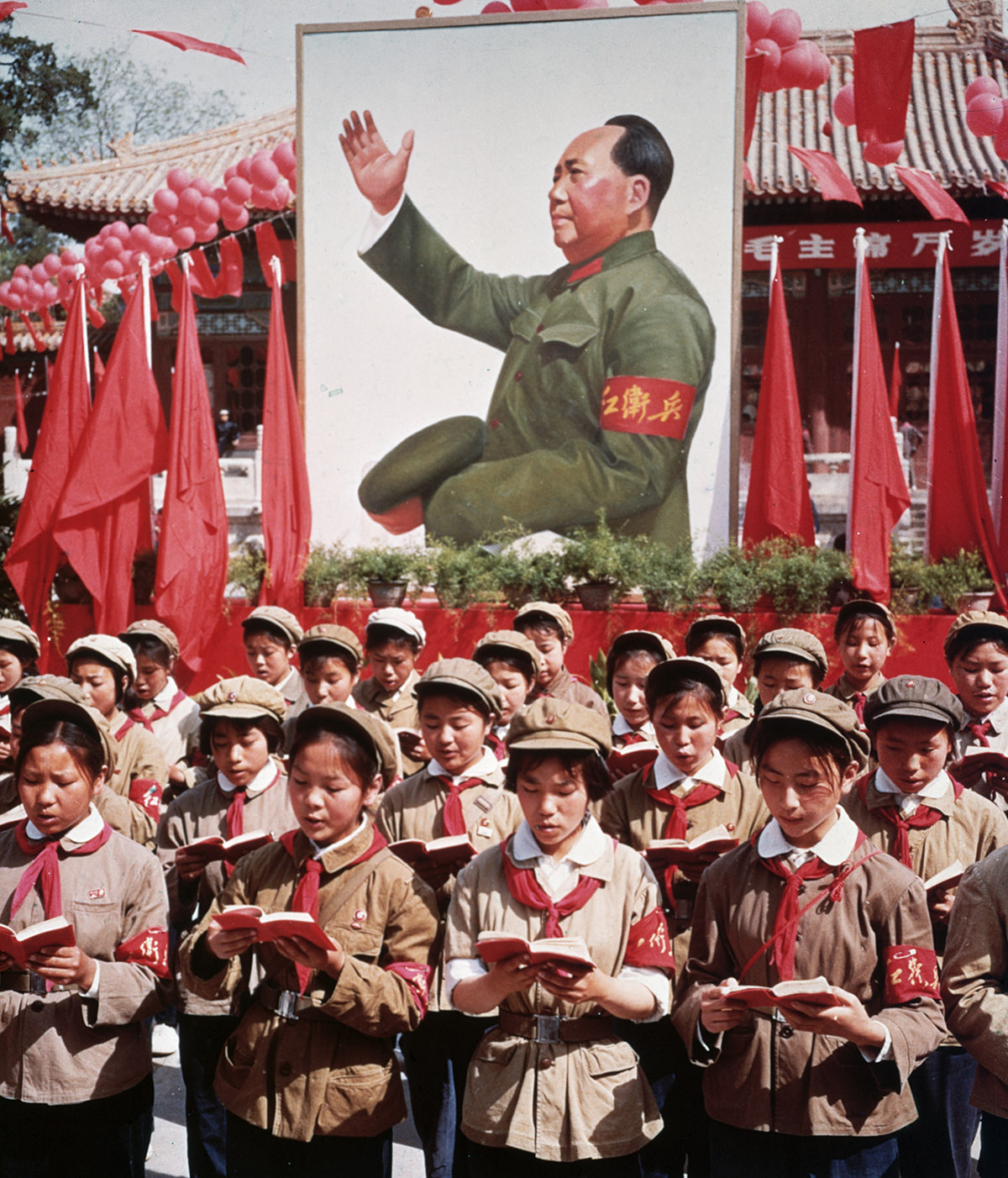
A group of children in uniform in front of a picture of Chairman Mao Zedong holding Mao's 'Little Red Book', circa 1968. (Photo by Hulton Archive/Getty Images)
Under the notion of bridging socioeconomic gaps and rural-urban divides, people deemed Rightist or bourgeois such as Jamie’s grandfather were heavily persecuted. Both Yue and Jamie’s parents have told them stories of divisions sowed between neighbours, friends and even family as people sought to protect themselves by revealing incriminating information to the authorities.
Yue’s mum, being younger than her dad, is of the generation that spent their formative years under the teachings of Chinese communism. She grew up in a world where every person carried a personal copy of the Little Red Book - a pocket-sized compilation of Mao’s sayings that reinforced Mao Zedong Thought and his cult of personality. For China’s youth, living in an environment permeated by Maoist ideology instilled a genuine dedication to the Revolution that transcended mere self-protection.
“When Chairman Mao died,” says Yue, “my mum told me she cried even harder than she would imagine if her parents died. To her, it was like a god died.”
Then came the economic reforms and opening of China in the 80s and 90s, and Yue says it was like “the whole society’s moral system just corrupted, just in front of my mum’s eyes.” The new pursuit of capital was so anti the communist doctrines instilled in her through years of Maoist education; it was image-focused, greedy and, worst of all, American.
For Jamie’s parents, who came of age at the tail end of the Cultural Revolution and received less of that all-consuming communist education, entering the economic reform era had less of a whiplash effect. Jamie’s dad participated in the student-led protests for democracy that took place throughout China in 1989, and culminated in the Tiananmen Square massacre on 4 June. But after that moment of activism, he entered the private sector and benefited from the government’s movements towards growing the privately-owned economy.
“So in some ways, he maybe sees the government as - they have done good things for me,” says Jamie.
And this era of growing prosperity tastes much sweeter when you have known struggle. Comparing her and her dad’s lived experiences, Yue says, “I was born in 1990, he was born in the 1940s, even before the CCP got into power, so he’s still got that very vivid memory of starvation. I have none. I was raised in - not in rich or wealthy family, but I got fed. They didn’t have shoes back then.
“At some extent, they feel like CCP really helped them to gain that material living standard. To me, it’s like,” - Yue waves her hand in a dismissive gesture - “I didn’t feel that.”
Yue believes that for people in their 50s, who are slightly younger than her parents, those positive feelings for the Chinese government are even stronger. They experienced the huge leap in standard of living since the 1980s, without having lived through the full brutality of the Cultural Revolution.
“They see how their life goes from a village boy that knows nothing, got nothing, can’t even get their belly full,” says Yue, “to have a car, have their own apartment, can even just buy a ticket and go overseas and spend a lot of money to have foreigners envy them. This... it’s a huge, huge step.”
Jamie and Yue’s parents, whose experiences are all unique from each other, all emerged from this period of upheaval with similar outlooks. They have neither a huge loyalty nor strong hatred for the CCP, neither great satisfaction with the status quo nor an energised idealism to change it. Rather, what they have is a tired scepticism, a desire for quiet stability and what Yue calls a “very complicated emotion towards the CCP.”
The right to protest
Jamie suspects his dad, who speaks positively from time to time about the democracy and freedoms they enjoy in New Zealand, is “quietly supportive” of the Hong Kong protests. But when he and Jamie’s mum learned that Jamie had attended a rally in Auckland supporting the Hong Kong protests, they discouraged him from further involvement. Coming from the same man who, when he was around Jamie’s age, was participating in the 1989 pro-democracy demonstrations in China, it seems contradictory. Jamie and I try to wrap our heads around it.
Maybe, after decades of turmoil, stability is an idyll. It’s better just to keep your head down, do your work and maintain this hard-earned life. However, there’s also the very concept of protest, which doesn’t sit as easily with our parents as it does with those of us who’ve grown up in New Zealand.
Alex, she of the Instagram story, says, “I’m definitely more critical of the government [than my dad]. I have the freedom to be critical, because I grew up in a place where freedom of speech is totally taken for granted.”
While the Constitution of the People’s Republic of China asserts that China’s citizens “enjoy freedom of speech, of the press, of assembly, of association, of procession, and of demonstration,” the exercising of these rights is so heavily proscribed for the sake of ‘social stability’ that they may as well not exist. After 4 June 1989, Chinese authorities carried out mass arrests of people involved in the Tiananmen Square protests. This, along with the terrible use of force to suppress the protests, sent a clear message.
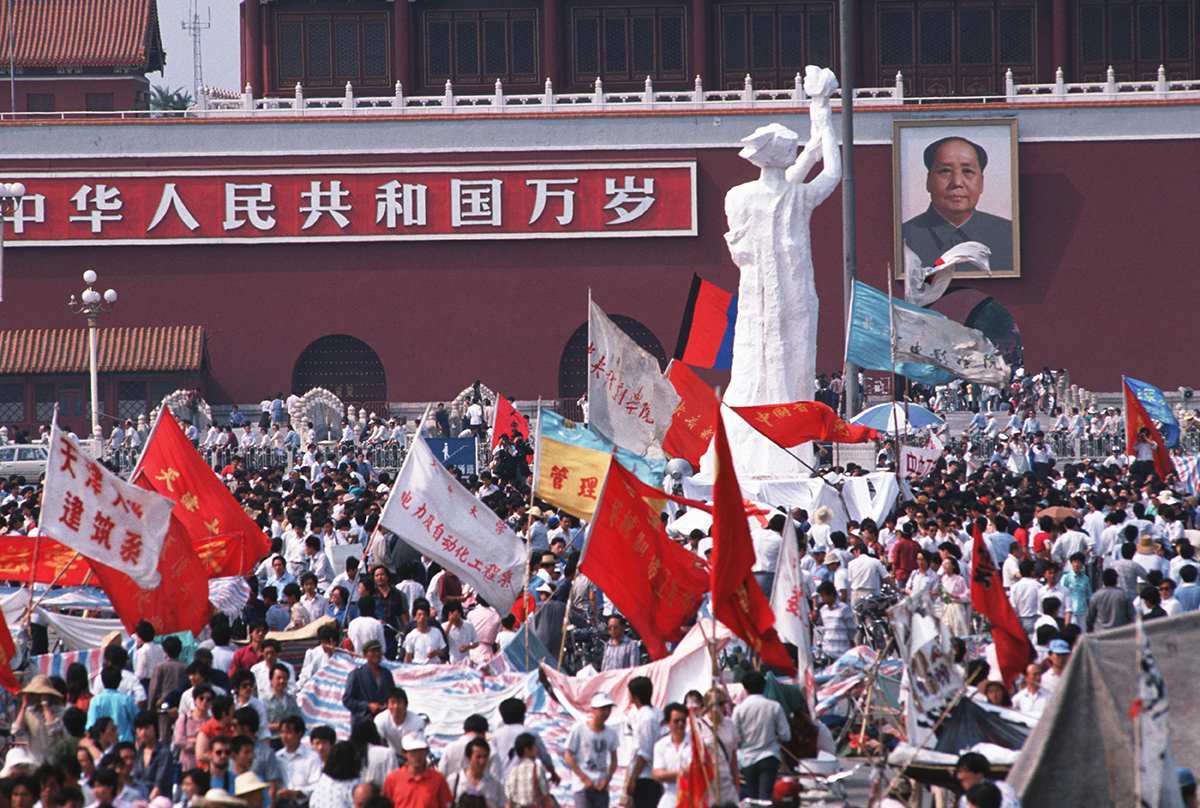
Pro-democracy demonstrators at Tiananmen Square on 1 June 1989. (Photo by Peter Charlesworth/LightRocket via Getty Images)
“If they don’t talk about it again or praise it, then you can get on with life. I think that affected them in terms of how much they speak up,” says Jamie, reflecting on how the aftermath impacted his parents’ psyche. “There’s always this fear of retribution from the government, I guess. So it sort of encourages them to not get involved too much, and not get deeply passionate about things.”
In a one-party state that seems to only be growing more authoritarian under Xi Jinping’s leadership, even if you have the backing of the Constitution, it’s safer to stay quiet and not make any waves. While the specifics of the consequences are murky, you’re conscious that, in Jamie’s words, “if you’re vocal, something bad might happen to you.”
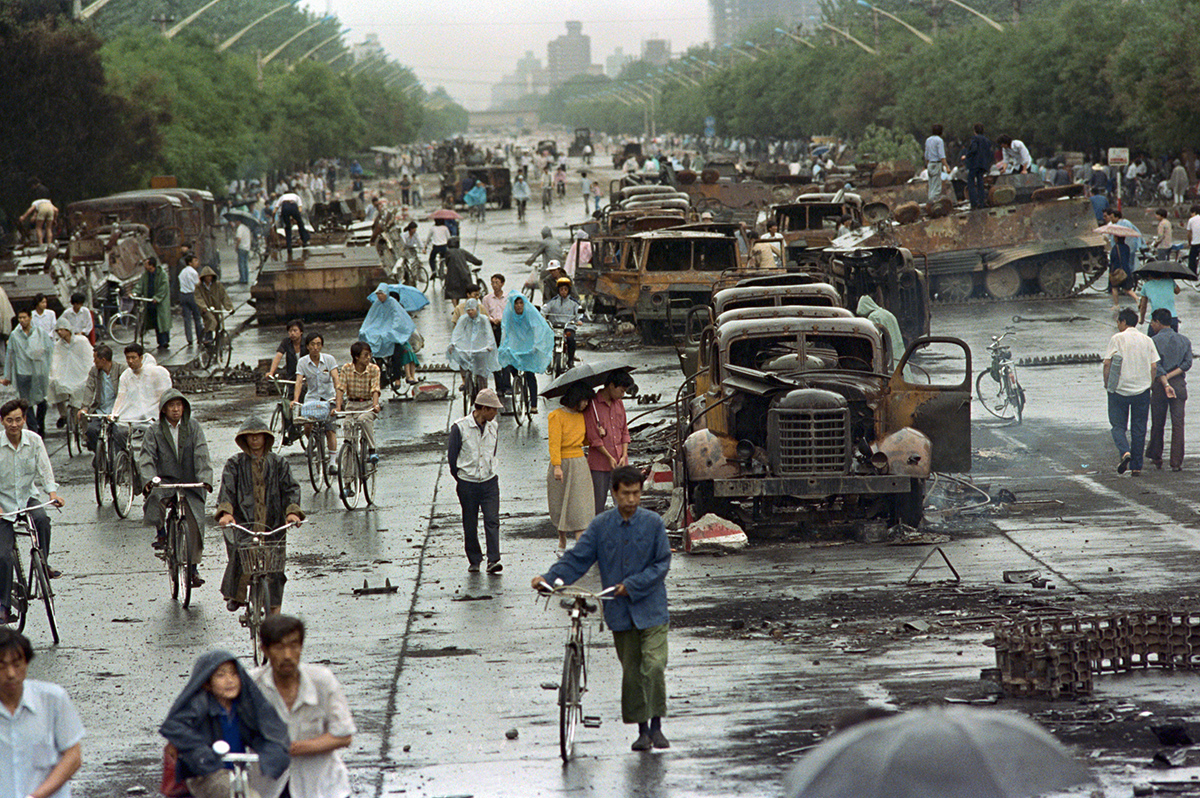
People walking through the aftermath of the Tiananmen Square massacre of 4 June 1989. (Photo by David Turnley/Corbis/VCG via Getty Images)
Which brings us to the fact that Jamie, Yue and Alex have all asked to be anonymous for this article.
Speaking on this choice, Jamie says, “I feel like it’s not really a decision I can personally make in some ways, because it might affect people I know in China. It kind of feels like it would be unfair if I went public and they might get that knock on their door and get unwanted attention.”
Jamie is referring to the incident of Chinese officials visiting the family of an international student who participated in demonstrations supporting the Hong Kong protests at an Australian university. His family in China was warned against his participating in “anti-China rhetoric” in the future, while his mother assured the authorities of her son’s loyalty.
“I feel like probably nothing will happen if I gave away my identity,” says Jamie, “but it’s this possibility of something happening that makes people second guess.”
Someone recently told me they’d become more wary of who they accepted on Instagram, knowing there are surveillance bots monitoring the Hong Kong protests. Such is the insidious impact of the CCP that we are self-monitoring and second-guessing our actions here in New Zealand.
Official narratives and communication through filters
When speech is this tightly monitored, it becomes clear that any inability to connect with our parents on the issue of Hong Kong is not just based on differences in lived experience - it is also a matter of differences in the information we receive.
The narrative of China’s flowering economic prosperity after decades of mass poverty, which has gained the CCP the faith of the growing middle class, is also an official Party line which our own Leader of the Opposition Simon Bridges has recently graciously repeated on Chinese state media. It supports the oft-repeated maxim of Deng Xiaoping who led China through its period of economic reform: 发展是硬道理 (fāzhǎn shì yìng dàolǐ) - development is the absolute principle. Greater political freedoms are desirable, but economic prosperity trumps all.
On top of this rallying around economic development, there are several more narrative strands, embedded in state media and school curriculums, that engender a deep nationalism. The first recurring theme is the ‘century of humiliation,’ the notion that China has endured a century of bullying under the hands of Western powers and Japan, but is now regaining its strength and must not let foreign players overpower them again. Yue says that her parents “still believe that outside China there are a lot of people, a Western force, trying to fuck up their minds.”
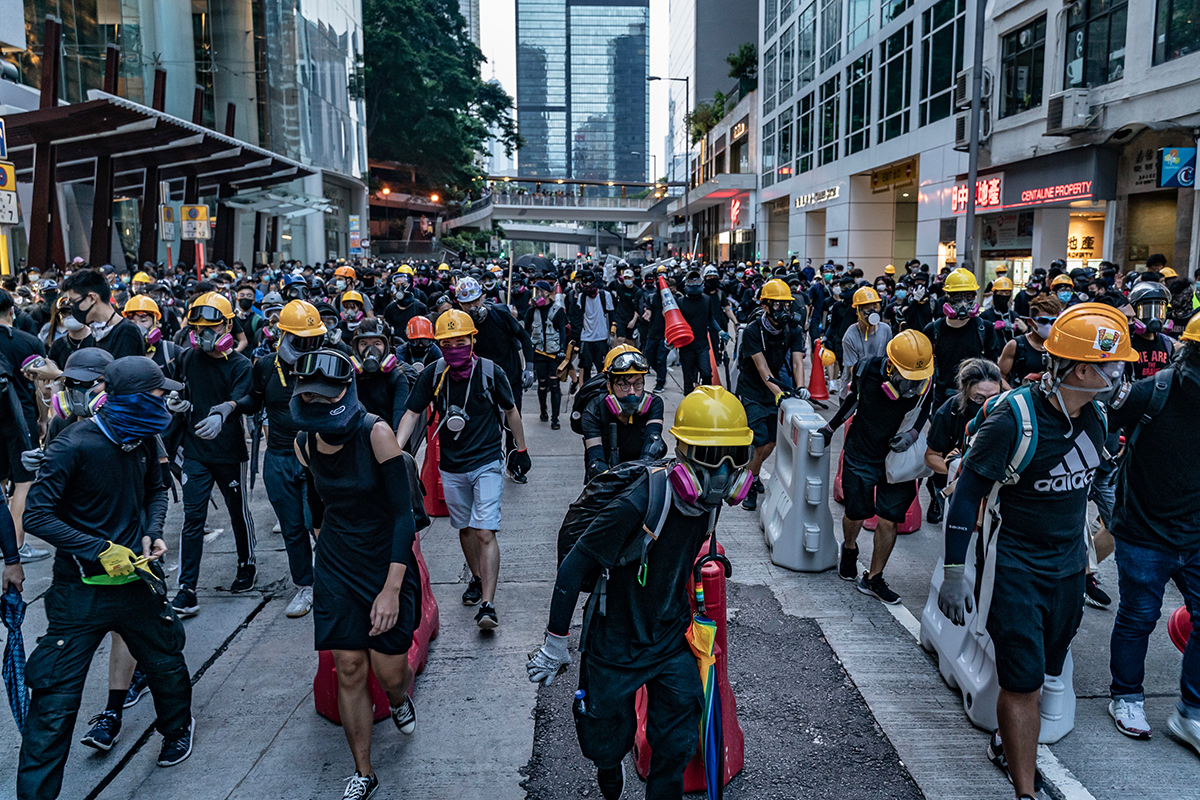
Protesters prepare to face off with police at a makeshift barricade. (Photo by Chris McGrath/Getty Images)
Then there are mainland Chinese people’s experiences of discrimination in Hong Kong. Yue says that when her mum was younger, she moved to Hong Kong to try and make a living there, like many mainlanders after China opened its doors in the 1980s. However, her inability to speak Cantonese and her mainland appearance marked her as an outsider and subject to mistreatment. “Back then we all look like peasants,” says Yue, “and it’s easy to be the target, because you’re the only one in the community who look like that and doesn’t speak Cantonese. You’re different.”
While the first interactions between mainland China and Hong Kong at the dawn of China’s reform era must have felt like a clash of two worlds - following decades of Hong Kong being the only portal for China to trade with the outside world, while the rest of China remained insulated from foreign contact - those differences have ebbed over time. Nevertheless, Yue says “when Chinese people are talking about it, they can’t help to relate those memories into this current issue [of the protests].” For her mum who experienced the discrimination first hand, this resentment “is in her bones.”
And, Yue adds, “the CCP definitely knows how to use this.”
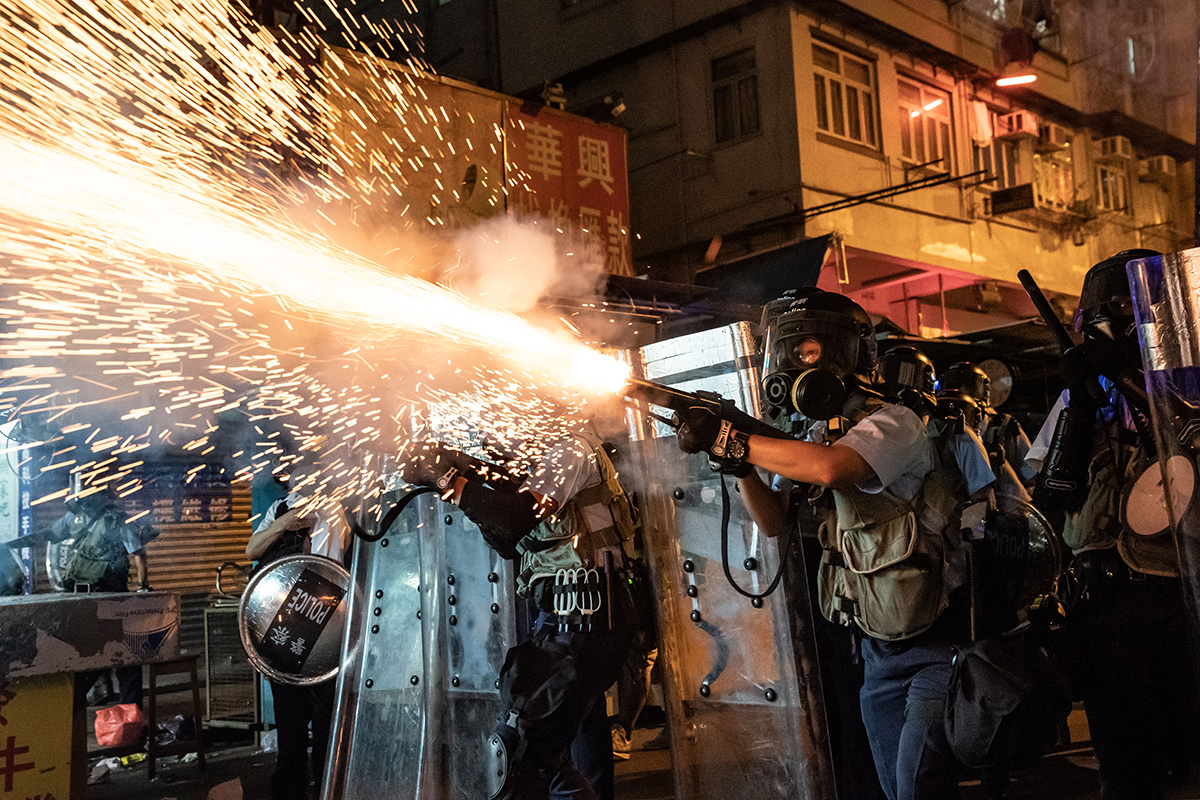
Police fire tear gas to clear pro-Democracy protesters during a demonstration. (Photo by Anthony Kwan/Getty Images)
One method that the CCP employs, says Yue, is to conflate the concepts of nation, people and party. “So when we are talking about China, we’re talking about ourselves, about the People’s Republic of China, also we’re talking about the CCP, so you can’t distinguish them.” When some Hong Kongers protest for independence from China, it’s not just an affront to the government, but to the people. “When you are attacking the Chinese government,” says Yue, “you are attacking them.” It’s like entwining your national identity with the Labour Party.
This conflation makes the rhetoric surrounding China’s economic prosperity and freedom from foreign powers even more emotionally stirring. “So when the Chinese government are talking about their achievements, the people think that’s their achievements as well,” says Yue. “We Chinese people, we got stronger. It’s populist, somehow.”
So how do we talk with our parents?
Since moving to New Zealand and comparing the media coverage she has free access to here versus the coverage she had in China, Yue is hyper aware that her parents in China are receiving news that’s filtered through these lenses. And she feels frustrated when she hears her dad repeat heavily biased news from the state media. “Especially when his judgement is based on that false information, because I just feel like that side is winning.”
So she tries to inform them the best she can - although it sometimes makes her dad angry, as he’s wary of New Zealand’s status as a member of the Five Eyes and is as distrusting of her information as she is of his.
Yue scrolls through her WeChat group with him, which has become a back and forth series of links and screenshots that they want each other to read. However, in order for Yue to avoid the censor filters and know her messages will actually get sent to her dad’s phone, she must black out all the ‘sensitive’ words like “independent”, “CCP” and “Xi Jinping”.
“So it’s a picture of lots of black spots on it,” says Yue. “If I want to share the information that I’ve got, not only should I translate it into Chinese first, but also I have to avoid all the sensitive words. [...] And after that, how can you make sure the info, the dialogue that you have with your parents, is actually what you want to say? Because you filter a lot by yourself already.”
Sometimes, it’s not worth the trouble. “If he gets a heart attack, I will be the responsible one,” she says, half joking. “And also when we do video chatting, you don’t want to just be angry with each other. We are living in different countries, we want that connection rather than separation.”
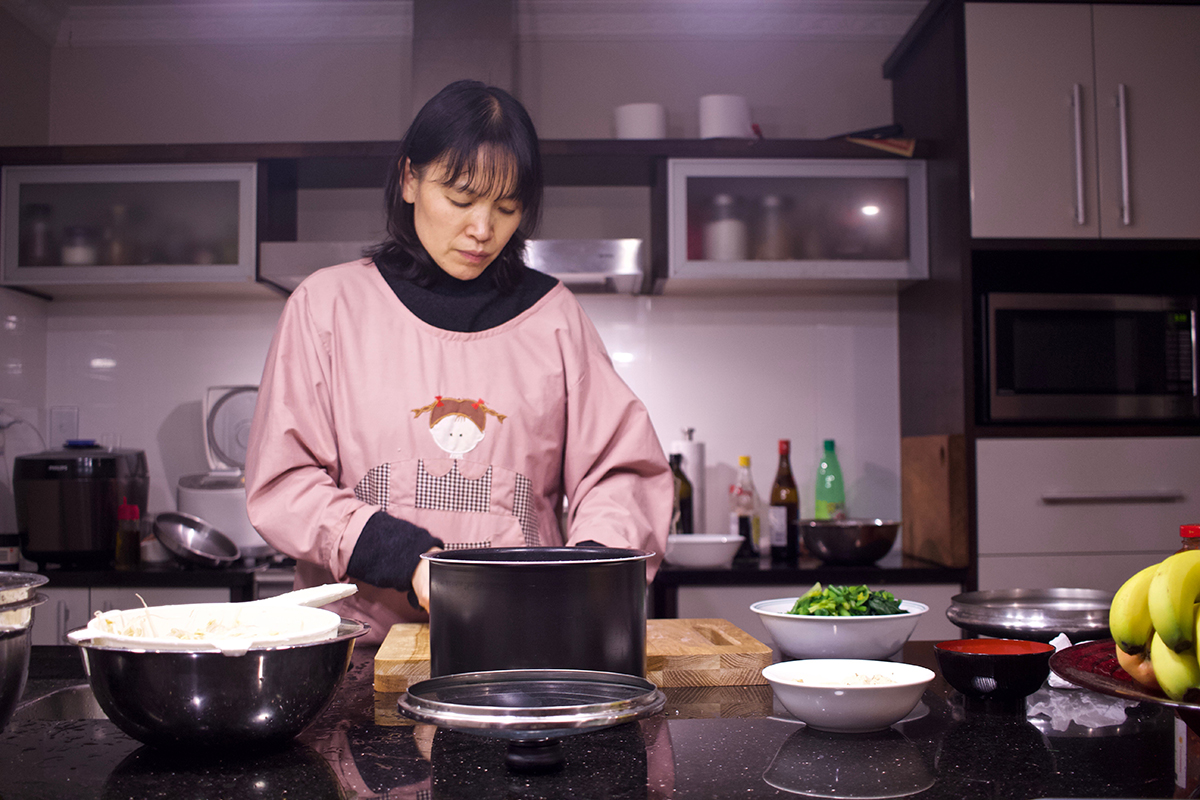
The writer's mum in the kitchen preparing dinner - a typical setting for debates on global politics.
Trying to bridge chasms between histories and experiences to talk constructively about this issue with your parents is a kind of emotional labour. When Alex reflects on that Instagram story, she remembers it less as about venting frustration as it was about being proud that she had the conversation with her dad in the first place.
Jamie says his desire to engage with his parents on the topic of the Hong Kong protests is partly driven by wanting to unravel the seeming contradictions in his parents’ perspectives: his dad’s activist history and discouragement of Jamie’s own activism, his mum’s distrust of the Communist Party and “parrot[ing]” of “nationalistic stuff.”
“I guess I want to understand, so what is her actual position?” says Jamie. “Maybe it’s futile, we have lived very different lives, very different experiences. But maybe it’s part of relating to your parents, trying to get them to understand where you’re coming from.”
Children of immigrant parents will know that differences not only in age, but in cultural knowledge and language, can make it feel like your minds exist in separate worlds. There’s a yearning to really understand your parents. Under this cynicism and pragmatism, how do I get to know the idealistic, brave soul that protested for enfranchisement and moved away from their family and friends to start a new life in a country where they knew no one? And how can I get them to really know me?
“It’s very hard to have a deep conversation with your parents if you have that kind of thing,” says Alex, referring to the cultural difference. “The thing that surprises me every time is if I tell a joke and my dad gets it.
“It’s so satisfying seeing your parents laugh.”
*Name changed at person's request.